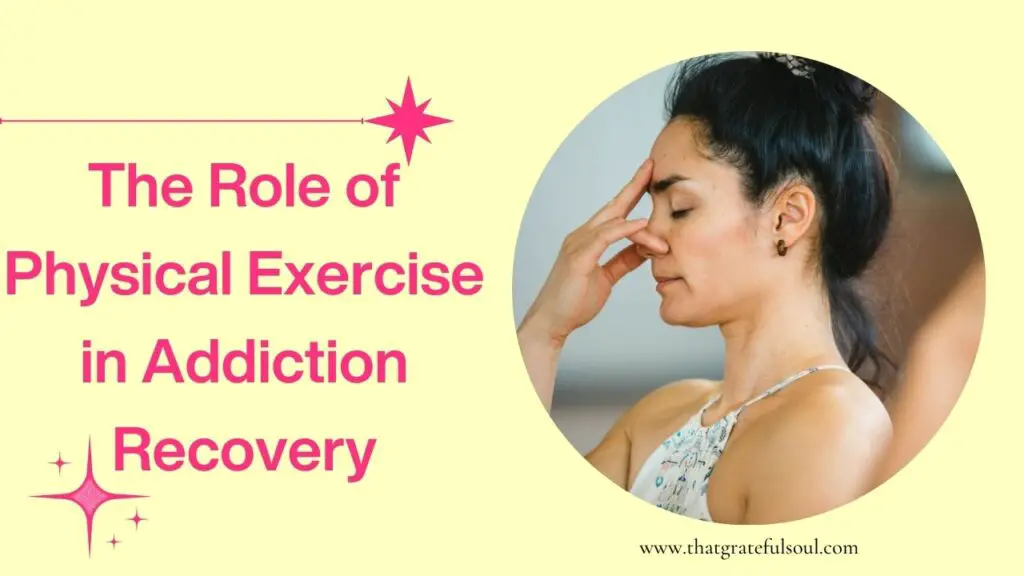Addiction recovery is a challenging journey that requires a comprehensive approach to address the physical, psychological, and emotional aspects of addiction.
While traditional therapies and treatments play a crucial role, integrating physical exercise into the recovery process can have significant benefits. Physical exercise not only enhances overall physical health but also contributes to improved mental well-being and long-term sobriety.
In this article, we will explore the powerful role of physical exercise in addiction recovery and the positive impact it can have on individuals seeking a life free from addiction.

-
Save
Table of Contents
The Role of Physical Exercise in Addiction Recovery
1. Physical Exercise and the Brain
Engaging in regular physical exercise positively affects brain function and can help individuals in addiction recovery rebuild their cognitive abilities. Substance abuse often disrupts the brain’s natural reward system, leading to imbalances in neurotransmitters.
Physical exercise has been shown to stimulate the release of endorphins, dopamine, and serotonin, which are all essential for regulating mood, reducing stress, and promoting feelings of well-being.
A study conducted by the University of California, San Francisco, found that aerobic exercise, such as running or cycling, can promote neurogenesis—the growth of new neurons—in the hippocampus, a brain region associated with learning and memory.
This neurogenesis can help repair some of the damage caused by substance abuse and improve cognitive function.
2. Reducing Cravings and Withdrawal Symptoms
One of the biggest challenges in addiction recovery is managing cravings and withdrawal symptoms. Physical exercise has been found to alleviate these symptoms by reducing stress and anxiety, which are common triggers for relapse.
When engaging in exercise, the brain releases endorphins that act as natural painkillers and mood elevators, providing a healthy alternative to the temporary relief sought through substance use.
A study published in the journal Drug and Alcohol Dependence demonstrated that individuals who participated in regular physical exercise during their early recovery experienced reduced cravings and reported fewer withdrawal symptoms compared to those who did not engage in exercise.
The researchers concluded that exercise could be an effective adjunct therapy for managing substance cravings and promoting abstinence.
3. Improving Mental Health and Well-being
Addiction often coexists with mental health disorders such as depression and anxiety. Physical exercise has been proven to be an effective natural treatment for these conditions, providing individuals in recovery with a holistic approach to healing.
Exercise stimulates the release of endorphins, which act as natural mood enhancers, and reduces the levels of stress hormones such as cortisol.
A meta-analysis published in the Journal of Psychiatric Research reviewed multiple studies and found that exercise interventions significantly reduced symptoms of depression and anxiety.
4Engaging in regular physical activity can help stabilize mood, increase self-esteem, improve sleep patterns, and enhance overall mental well-being.
4. Social Support and Community Building
In addition to the physical and mental health benefits, exercise also offers an opportunity for individuals in recovery to build social support and create a sense of community.
Many addiction treatment centers incorporate exercise programs as part of their comprehensive approach to recovery.
Participating in group exercise sessions or joining sports teams can foster a sense of belonging, accountability, and camaraderie among peers facing similar challenges.
Exercise-based support groups, such as running clubs or yoga classes specifically designed for individuals in recovery, provide a safe and supportive environment.
These groups can help combat feelings of isolation and provide a platform for individuals to connect, share experiences, and establish healthy relationships built on mutual support.
Conclusion
Integrating physical exercise into addiction recovery programs can significantly enhance the overall well-being and success of individuals seeking a life free from addiction.
The benefits of exercise extend beyond physical health, encompassing improved cognitive function, reduced cravings and withdrawal symptoms, enhanced mental well-being, and the establishment of a supportive community.
-
Save

